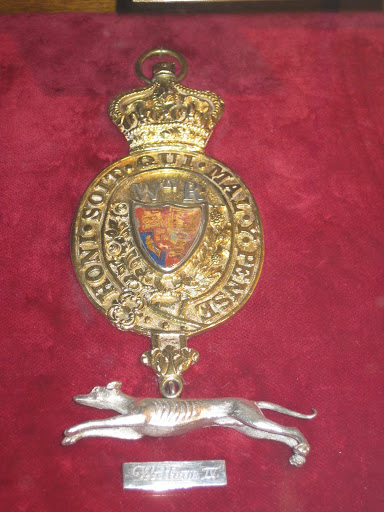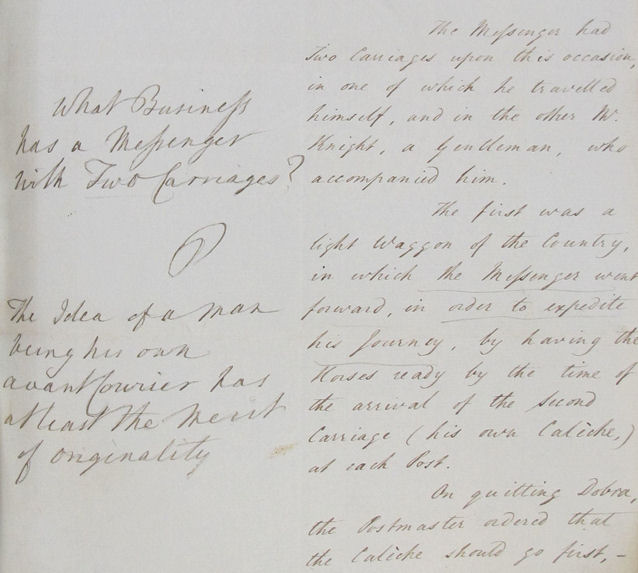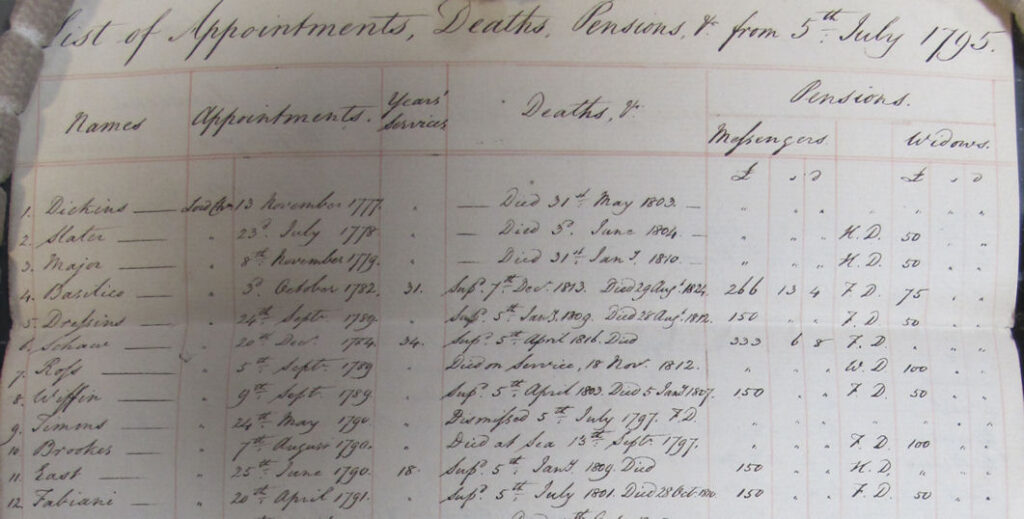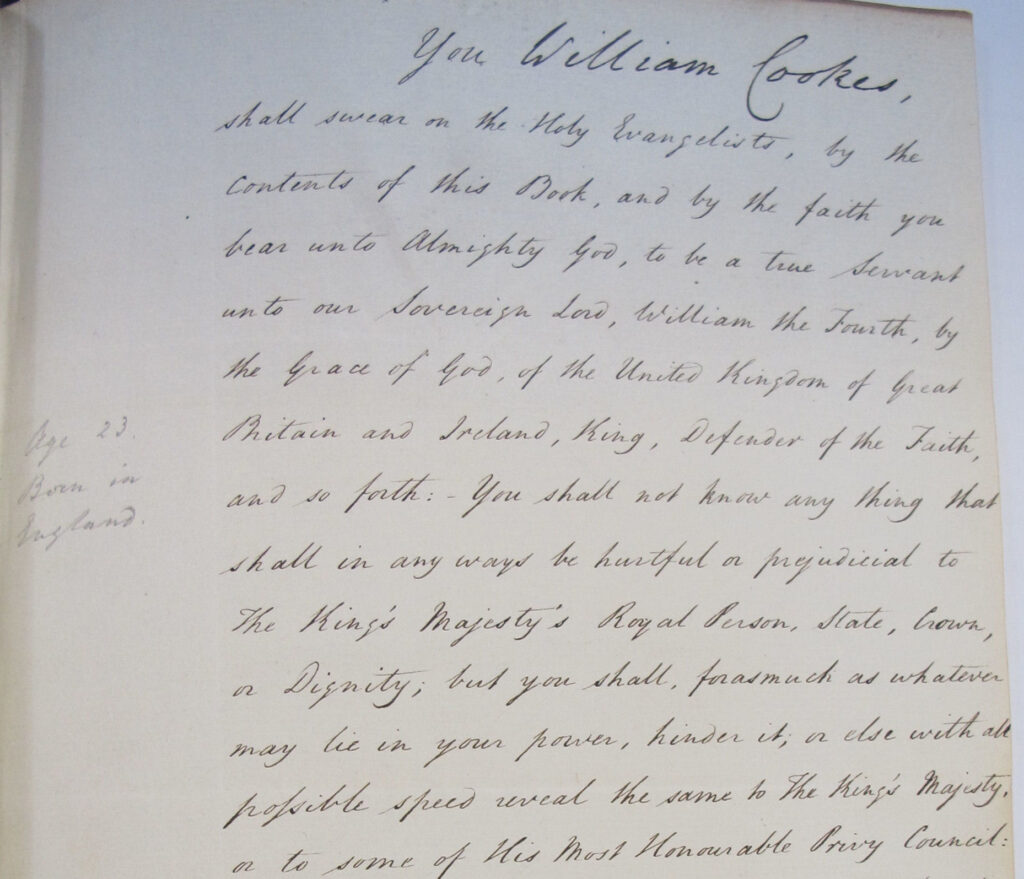Everyone likes the opportunity to travel in their job; especially if you are asked to go overseas, and sometimes you may choose to take your work home with you. This is a long established practice for many occupations. But the history of the King's (Queen's) Messengers gives us a different perspective on 'out of office ' working.

History
Diplomatic relations between nations have always necessitated the relaying of sensitive messages. The King's Messengers have been employed to carry Royal messages since the 15th century. Richard III reputedly employed a messenger to hand deliver his private papers in 1485.
Charles II employed four messengers. When asked how they were to be identified as His Majesty's messengers, Charles II broke off four greyhounds from a silver breakfast platter and presented each with this token. This has remained the symbol of the Messenger to this day.
Originally each government department would have had their own messengers. These messengers were gentleman of high standing, and were unlikely to merely deliver packages. It is more likely they employed others to do their work for them.
In 1641 'Forty messengers of the Great Chamber of Ordinary' were lodged in the Royal Palaces, under the orders of the Lord Chamberlain.
The formation of the Foreign Office in 1782 saw the King's messengers take a more prominent role. The Messenger Service was now divided into two separate divisions, King's Home Service Messengers and Corps of King's Foreign Service.
Europe at War
The messenger role was particularly hazardous from 1795. With France at war with most of Europe including England, the Messenger's role became not only important but also dangerous. A Messenger travelling through France was highly vulnerable.
It was now impossible to predict when a messenger would arrive back in London. These delays caused the Foreign Office to use Home Service Messengers for foreign duty. A restructure, in 1795, resulted in 30 messengers interchanged between Home and Foreign Service.
Unwanted servants, valets, sons of trusted servants and other 'less desirables' were now appointed, resulting in the Diplomatic Corps regarding them as 'a very subordinate class'.
Some were killed whilst on duty. However, despite the dangers, the messengers still succeeded in their duties. One reported/notable story involved a messenger, thought to be Andrew Basilico:
Andrew Basilico was sent to Europe to deliver a package. This involved travelling through France. With the threat of the messenger being caught, the dispatch was written in a small corner of a sheet of paper. Basilico was caught and the French, on opening the packages, only found bundles of plain paper. Basilico, knowing indeed he was about to be caught, had eaten the corner of the dispatch. He was later exchanged for a French General.
Another interesting tale concerns a messenger who was to escort a prisoner back to London. He ended up taking the prisoner home. His wife dutifully cooked a meal for the three of them. With no guards, the husband and wife were obviously taking a considerable risk, and slept with a loaded pistol - not the sort of work you would volunteer to take home today! The prisoner is likely to have been a Gentleman or Officer rather than your usual rogue.
As well as heroics there were also disciplinary matters.
In 1834 a complaint was made against William Cookes returning from Vienna. The complaint from an Austrian Post Master at Dobra reported Cookes use of two carriages; the second being for a Mr Knight, gentleman. He commented: 'what business has a messenger with two carriages?' followed by 'the idea of a man being his own avant courier has at least the merit of originality'.

Finances
The amount a Messenger could claim for each journey was predetermined with tables showing the amounts for every journey. Messengers often tried to make extra money by selling the empty seat in their carriage. This legitimately helped cover costs and provided a companion for the journey. But they charged heavily for the seat and in 1837 Lord Palmerston tried to prohibit this custom. This ban was however suspended after a series of memorandums from Lewis Hertslet to remove this 'hardship'.
Lewis Hertslet was the Superintendent of Messengers, and Foreign Office Librarian until he retired in 1854. Appointed in 1824 he was under the direct authority of the Foreign Office.
Tracing a service history

Although there are no dedicated files on the service records of these messengers, you can trace their journeys and careers through various sources at The National Archives:
• The Foreign Office List includes the messengers by name
• Lewis Hertslet's papers in FO 366, and the miscellaneous series in FO 95, contain financial papers relating to the messengers. These include the Oaths sworn by messengers, allowances for journeys and applications for pensions and sick leave.

One can also find lists of the dates of appointment, deaths and pensions received, the number of year's service, and names of those who died in service. For example, Andrew Basilica was appointed on 5 October 1782 and retired after 31 years service on the 7 December 1813 with a pension of £266 13s 4d. He died on the 28 August 1824 leaving his wife a pension of £75.
There are plenty of records relating to the accounts, expenses and appointments of the messengers. These bills list the expenses claimed for each journey, and using these records you can trace an individual messenger's career.
In 1824 Lewis Hertslet was promoted to Superintendent of Messengers. His changes to the Messenger service would last until the 20th century.
Today
The Corps of Queen's Messengers still exists today, as not everything can be sent by electronic or registered mail. In 2005 there were reportedly 15 messengers in Her Majesty's Service. They are still issued with a red passport. They still carry the official sealed diplomatic bag which cannot be inspected by customs officers.
The job is not for a 'shy, retiring wallflower'. If you wanted a role travelling the world, you would need to:
- Like travelling and your own company
- Remain calm and confident in chaotic, stressful or uncomfortable situations
- Keep a secret
- Be interested in foreign affairs and working for the government
Not your everyday travelling job, perhaps.
Further reading
The papers of Lewis Hertslet are in The National Archives' series FO 366, other records include FO 351; when he was the Foreign Office Librarian; and FO 95 Miscellaneous files.
The History of the King’s Messengers, V Wheeler-Holohan (Grayson and Grayson, 1935)
Keep tabs on the past. Sign up for email updates from this blog.
17 comments
Comment by Jonathan Pope posted on
- Superintendent of Messenger’s - I think you have an unecessary apostrophe.
Comment by Mark Dunton posted on
Thank you Jonathan, well spotted, we have corrected this.
Comment by Tom O'Kelly posted on
any details on messenger named D.P. O'Kelly or P. O'Kelly
Comment by Tom O'Kelly posted on
trying to chart family tree
Comment by Sylvie Geigel posted on
And details on messenger Harry Houlton Vivian? d. 1929. Thanks!
Comment by Keith Mitchell posted on
Thanks for your comments Tom and Sylvie
Unfortunately we are unable to undertake research via this site, please see how you can undertake research on http://www.nationalarchives.gov.uk/records.
I would suggest you firstly search the Foreign Office Lists, available in the Research and Enquiries Room at The National Archives (TNA), Kew, to ensure they were Foreign Office Messengers and identify which dates they served. You then need to search the FO 366 files for references to their names to establish his journeys and career. This series is not catalogued by names, so you will need to search through numerous files to find their details. TNA staff would be happy to show you how to proceed with your search – alternatively you can find out about the paid research options; http://www.nationalarchives.gov.uk/records/paid_research.htm.
Comment by Iain Bamber posted on
While Wheeler-Holohan is indeed a very good source for the history of King's Messengers (and one of many such books written), may I also draw your attention to the book that I produced - "From Pouch to Passport A History of Kings and Queens Messenger Insignia"
I produced this book on retirement from the appointment of Superintending Queen's Messenger and it covers the period of these Royal Messengers from before the 12th century to my retirement in 1996.
Always happy to respond to any queries on this subject.
Comment by Keith Mitchell posted on
Hello Iain, thank you for this. I was unaware of your new book, and look forward to a most interesting read.
Comment by D.J.Wallington ( Derek. John ) posted on
Hi my interest are two fold one a friend of mine who sadly is no longer with us told me his father was a queens messenger, and when he was a child had on the odd occasion accompanied him to No 10 Downing Street, and the role normally was passed down from father to son, I believe he was a Sargent major in the army , but he did not follow in his father's caree.
My other interest is many years ago I purchased a sword stick with a silver greyhound head on showing it to the friend just mentioned that's when he stirred my interest.
Comment by D.J.Wallington ( Derek. John ) posted on
What a proud and humble job, I would love to have been a queens messenger.
Comment by Jane Allen posted on
Keith in reading your blog I am wondering if you have any personal connection to William Cookes since you show two documents relating to him. He was my great great grandfather and I am currently reading his wife's diary of their trip to Malta in 1839 to deliver a message there.
Comment by Keith Mitchell posted on
Unfortunately, I don't have any personal connection to the Messenger Service, just an interest in the records and the Foreign Office. I used William Cookes as he was a good example to use.
Comment by Robin S. Taylor posted on
The fifth paragraph of the "Europe at War" section begins with the line "Andrew Basilico, was sent to Europe to deliver a package. " - in which the comma serves no apparent purpose.
Comment by Mark Dunton (Editor) posted on
Corrected, thanks Robin
Comment by Snowskeeper posted on
Hi. Sorry for bothering you, but do you know what happened to the silver greyhounds the King gave to his new messengers? I'm trying to build a character for a roleplaying game, and one of the cool things about it is that old objects tend to have great power depending on their significance. One of the small, silver greyhound used to inaugurate the Queen's Messengers seems perfect, especially since it lacks the tackiness of, say, the train car the treaty of Versailles and the surrender of France were signed in.
Great article, either way; cheers!
Comment by Keith Mitchell posted on
I am glad you liked the article. I think the badge would have remained in the possession of the Messenger, it is unlikely they would have been required to surrender the Silver Greyhound to the Foreign Office. You can occasionally find the badges in museums, or for sale on various auction sites.
I wish all the best with your game
Comment by M Bunce posted on
Anyone come across Robert .A.B. Thomas - a messenger in WW2? I would like to research him for my family